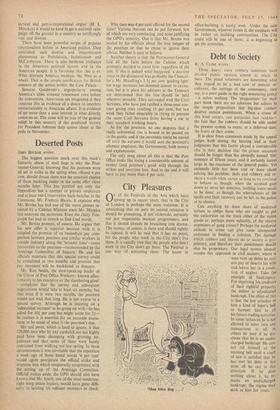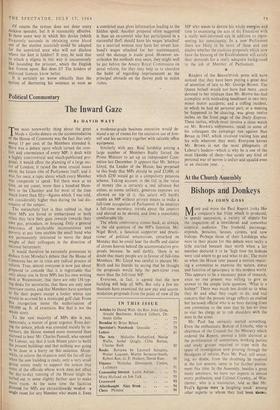Debt to Society
R. A. CLINE writes :
Those heavy train robbery sentences have divided public opinion almost as much as Suez. The penal reformers are lamenting what they regard to be a bad case of judicial re- cidivism; the outrage of the community, they say, is a poor guide to the right sentencing policy —it solves nothing. The 'pragmatists for their part think there are no solutions but adhere to the simple proposition that big-time robbers deserve outsize punishment. When a crime of this kind occurs, one particular fact rankles— the fact that the robbers should be able under the present system to enjoy, at a deferred date, the fruits of their crime.
It is clear from comments made by the appeal judges both during the hearing and in their judgments that this factor played a considerable role in their decision that the prison sentences should be longer than the absurdly named life' sentence of fifteen years; and it certainly looms large in the reactions of the general public. Yet curiously little has been said or done about solving this problem; theft and robbery will re- main a worth-while career so long as we continue to behave as though, when the accused goes down to serve his sentence, nothing more needs to be done, as though the whereabouts of the spoils and their recovery can be left to the police or to chance.
Of course the system does not deter every reckless spender, but it is reasonably effective. Is there some way in which this device (which frequently succeeds in obtaining some blood out of the stoniest material)-could be adapted for the convicted man who will not disclose Where the loot is hidden? It may be said that to attach a stigma in this way is uncommonly like hounding the prisoner, which the English law frowns upon. But does it? The holders of endorsed licences know better.
It is certainly no worse ethically than the System of shortening his sentence as soon as a convicted man gives information leading to the hidden spoil. Another proposal often suggested is than an ex-convict who has participated in a successful theft should have his wages 'attached' (as a married woman may have her errant hus- band's' wages attached for her maintenance), until the damage is made good. However un- orthodox the methods may seem, they might well be put before the Amory Royal Commission on penal reform, for they may help us to abandon the habit of regarding imprisonment as the principal obstacle on the thorny path to stolen riches.

























 Previous page
Previous page